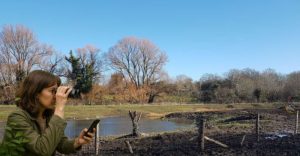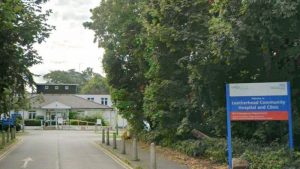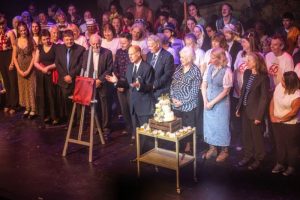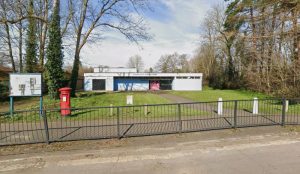What started as a local experiment in Cuddington has grown into one of Epsom and Ewell’s liveliest community-led wildlife projects.
After hearing news of the planned Grafton Stables nature reserve, local councillor and Heritage Champion Kim Spickett (RA Cuddington) invited members of the resident-led ERLIBIRD group (Elmstead Red Listed Bird Project) to help track bird and wildlife sightings in local gardens and parks.
A handful of streets joined in at first – but the idea quickly took off. A growing list of sightings is now published online as a Cuddington Bioguide (view here), with residents of all ages contributing.
“People are genuinely surprised by how much wildlife we have right here on our doorsteps,” Cllr Spickett told the Epsom and Ewell Times. “Smartphones and our street WhatsApp groups – originally just for neighbourhood watch – have given everyone the chance to learn, share and get involved. It’s sociable, it’s educational, and it brings real joy to people who might not be able to get outdoors themselves.”
A ‘nature superhighway’ through the borough
The Hogsmill River, cutting through the borough towards the Thames, provides the backbone for what residents have dubbed a “nature superhighway”. New initiatives such as a mammal tunnel at Malden Manor and fish passes along the river mean that creatures from bats to kingfishers can navigate the area more safely. The forthcoming Grafton Stables reserve is expected to act as a “service station” for migrating birds using the Hogsmill as a flight path.
Suburban gardens, railway embankments and small urban green spaces all play their part in supporting biodiversity. Conservation work in neighbouring boroughs Sutton and Kingston also influences what residents see in Cuddington, underlining how ecological networks cut across council boundaries.
Citizen science in action
The Cuddington Bioguide is part of a wider movement often described as “citizen science” – where local knowledge and volunteer time help build valuable datasets for conservationists.
Across Surrey, residents are already engaged in projects such as tree-mapping by EETAB (details here), seasonal species guides from the Surrey Wildlife Trust (visit here), and river monitoring supported by the South East Rivers Trust.
Digital tools have accelerated the trend. Facebook groups such as the Hogsmill Nature Reserve page have become hubs where experts and beginners alike share photographs, swap advice and flag up urgent issues like pollution or vandalism. Nationally, projects like the RSPB’s Big Garden Birdwatch and Butterfly Conservation’s annual count show how mass participation can generate serious research data while fostering community pride.
Growing beyond Cuddington
Cllr Spickett believes other wards could easily copy the model:
“Every residents’ association or friends group could nominate a local enthusiast to pull together sightings. It doesn’t have to be ward-wide – start with your street or park. Like everything else in the borough it runs on those magic fairies called volunteers, but the rewards are huge. We hope to keep our list running year on year so we can see how weather patterns and human activity – both good and bad – affect what we see.”
Plans are already in place to create a 2026 sightings page for Cuddington. The longer-term aim is to build a record that not only captures the delight of local birdwatchers but also contributes to understanding how climate and land management shape Surrey’s wildlife over time.
Sam Jones – Reporter Related reports: Grafton Stables to Remain Green Space















